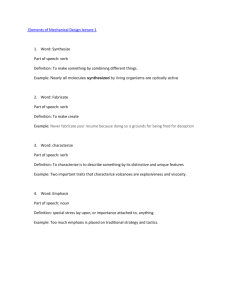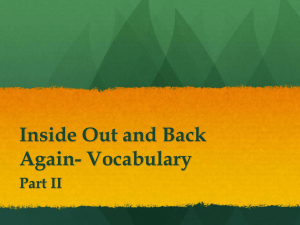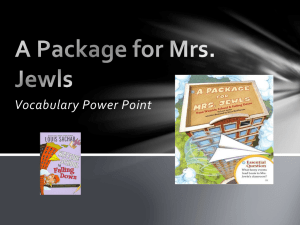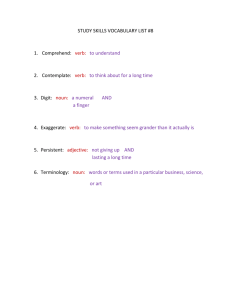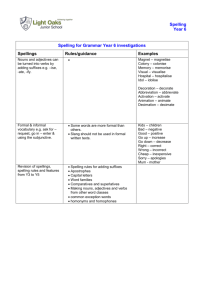Spelling - Parklands Primary School
advertisement
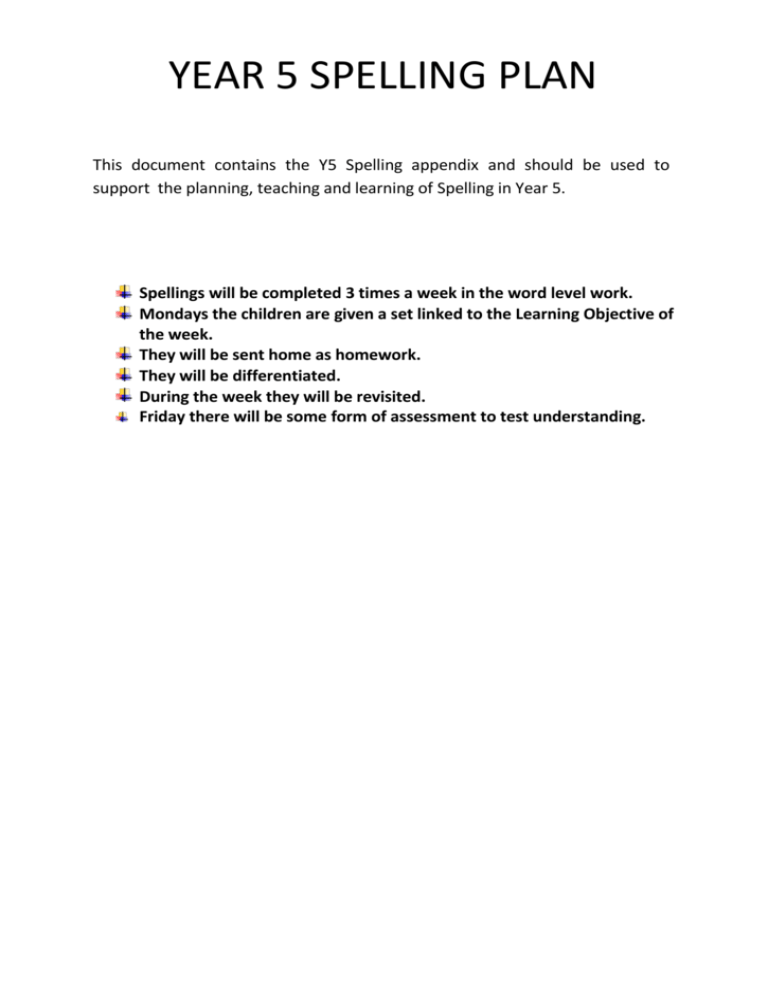
YEAR 5 SPELLING PLAN This document contains the Y5 Spelling appendix and should be used to support the planning, teaching and learning of Spelling in Year 5. Spellings will be completed 3 times a week in the word level work. Mondays the children are given a set linked to the Learning Objective of the week. They will be sent home as homework. They will be differentiated. During the week they will be revisited. Friday there will be some form of assessment to test understanding. National Curriculum 2014 Planning Document Y5 Spelling Appendix Revision of work done in previous years Statutory Guidance Non- Statutory Guidance Examples Words with the The ‘i before e except after c’ rule applies to words deceive, conceive, receive, perceive, /i:/ sound spelt ei where the sound spelt by ei is /i:/. ceiling after c Exceptions: protein, caffeine, seize (and either and neither if pronounced with an initial /i:/ sound). Words containing the letter-string ough is one of the trickiest spellings in English – it can be used to spell a number of different sounds. ough ought, bought, thought, nought, brought, fought rough, tough, enough, cough though, although, dough through thorough, borough plough, bough Words with ‘silent’ letters (i.e. letters whose presence cannot be predicted from the pronunciation Homophones and other words that are often confused Some letters which are no longer sounded used to be doubt, island, lamb, solemn, thistle, knight sounded hundreds of years ago: e.g. in knight, there was a /k/ sound before the /n/, and the gh used to represent the sound that ‘ch’ now represents in the Scottish word loch. In the pairs of words opposite, nouns end –ce and verbs end – se. Advice and advise provide a useful clue as the word advise (verb) is pronounced with a /z/ sound – which could not be spelt c. More examples: aisle: a gangway between seats (in a church, train, plane). isle: an island. aloud: out loud. allowed: permitted. affect: usually a verb (e.g. The weather may affect our plans). effect: usually a noun (e.g. It may have an effect on our plans). If a verb, it means ‘bring about’ (e.g. He will effect changes in the running of the business). altar: a table-like piece of furniture in a church. alter: to change. ascent: the act of ascending (going up). assent: to agree/agreement (verb and noun). bridal: to do with a bride at a wedding. bridle: reins etc. for controlling a horse. cereal: made from grain (e.g. breakfast cereal). serial: adjective from the noun series – a succession of things one after the other. compliment: to make nice remarks about someone (verb) or the remark that is made (noun). complement: related to the word complete – to make something complete or more complete (e.g. her scarf complemented her outfit). descent: the act of descending (going down). dissent: to disagree/disagreement (verb and noun). desert: as a noun – a barren place (stress on first syllable); as a verb – to abandon (stress on second syllable) dessert: (stress on second syllable) a sweet course after the main course of a meal. draft: noun – a first attempt at writing something; verb – to make the first attempt; also, to draw in someone (e.g. to draft in extra help) draught: a current of air. advice/advise device/devise licence/license practice/practise prophecy/prophesy farther: further, father: a male parent guessed: past tense of the verb guess guest: visitor heard: past tense of the verb hear herd: a group of animals led: past tense of the verb lead lead: present tense of that verb, 0r the metal which is very heavy (as heavy as lead) morning: before noon mourning: grieving for someone who has died past: noun or adjective referring to a previous time (e.g. In the past) or preposition or adverb showing place (e.g. he walked past me) passed: past tense of the verb ‘pass’ (e.g. I passed him in the road) precede: go in front of or before proceed: go on principal: adjective – most important (e.g. principal ballerina) noun – important person (e.g. principal of a college) principle: basic truth or belief profit: money that is made in selling things prophet: someone who foretells the future stationary: not moving stationery: paper, envelopes etc. steal: take something that does not belong to you steel: metal wary: cautious weary: tired who’s: contraction of who is or who has whose: belonging to someone (e.g.Whose jacket is that?) Achieve, ancient, average, awkward, bargain, bruise, committee, conscience, convenience, definite, desperate, determined, develop, embarrass, excellent, foreign, forty, government, guarantee, harass, identity, leisure, lightning, marvellous, mischievous, muscle, neighbour, nuisance, parliament, physical, queue, recognise, restaurant, rhyme, rhythm, shoulder, soldier, stomach, sufficient, suggest, symbol, system, temperature, thorough, twelfth, variety, vegetable, vehicle, yacht.





